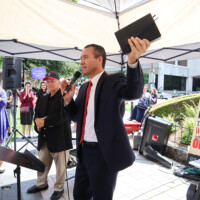
Huge Victory in U.S. 5th Circuit for Central Pastor
In April 2020, Rev. Tony Spell was arrested by Central Police Chief Roger Corcoran for holding worship services despite orders from liberal Democratic Gov. John Bel Edwards. At the time, Rev. Spell received some sage advice from one of his lawyers. Baton Rouge attorney Joe Long urged the pastor to go slow on pursuing his legal remedies. “People aren’t thinking clearly during this pandemic. They are doing things they would never do in normal times, and that includes the courts. Let the panic subside, and judges will start thinking clearly again.” That’s exactly what Rev. Spell and his attorneys’ did, and it appears to be paying off!
On Friday, June 11, the nation’s second highest court gave Rev. Spell a big victory. In a unanimous decision, the U. S. 5th Circuit Court of Appeals in New Orleans overturned the U. S. District Court in Baton Rouge in the case of Rev. Tony Spell and Life Tabernacle v. Louisiana Gov. John Bel Edwards.
Spell sued Edwards last year, saying the Governor’s Emergency Orders forbidding Spell from holding church services violated the First Amendment. The pastor was arrested and imprisoned for violating the Emergency Orders.
Last year, U.S. District Judge Brian Jackson threw out Rev. Spell’s suit. However, now the Court of Appeals has vacated Jackson’s decision, or reversed it, in light of U.S. Supreme Court decisions in Catholic Diocese of Brooklyn v. New York Gov. Andrew Cuomo and South Bay Pentecostal Church v. California Gov. Gavin Newsom.
In both cases, emergency orders attempting to close churches were struck down as violating the First and 14th Amendments to the U.S. Constitution. The 5th Circuit ordered Judge Jackson to rehear the case and apply the principles recently articulated by the Supreme Court in Catholic Diocese and South Bay.
Those cases are very favorable to Rev. Spell, and the district judge will be required to make his decisions in the case in accordance with the very clear rulings of the Supreme Court that closing churches or limiting attendance at churches is unconstitutional.
The ruling was a major victory for Rev. Spell’s legal team which includes former Alabama chief justice Roy Moore and Baton Rouge attorney Jeff Wittenbrink. They took on Gov. John Bel Edwards’ attorneys and won.
Here is the court’s decision:
United States
5th Circuit Court of Appeals
New Orleans, Louisiana
June 11, 2021
Before Wiener, Elrod, and Higginson, Circuit Judges. Per Curiam:
This case arises out of a series of executive proclamations issued by Louisiana Governor John Bel Edwards in response to the COVID-19 pandemic. Some of these proclamations imposed capacity restrictions on in- person religious worship gatherings. Plaintiffs, a pastor and his church, brought suit, alleging inter alia that these proclamations violated their rights under the Free Exercise Clause. The district court entered a final judgment dismissing the plaintiffs’ claims.
In its opinion, the district court applied rational basis review to determine that the plaintiffs had not stated a claim for violation of the Free Exercise Clause and also determined that the plaintiffs’ claims for injunctive relief were moot. In making its determinations, the district court did not have the benefit of considering the Supreme Court’s recent cases regarding how the Free Exercise Clause applies in the particular context of state-imposed COVID-19 restrictions on religious worship. See Roman Cath. Diocese of Brooklyn v. Cuomo, 141 S. Ct. 63, 67–69 (2020) (applying strict scrutiny to certain COVID-19 restrictions, and enjoining New York from enforcing COVID-19 restrictions on indoor worship); South Bay United Pentecostal Church v. Newsom, 141 S. Ct. 716 (2021) (enjoining California from enforcing its COVID-19-related ban on indoor worship); Tandon v. Newsom, 141 S. Ct. 1294, 1297–98 (2021) (applying strict scrutiny to California’s restriction on private religious gatherings, and enjoining California from enforcing those restrictions).
We express no opinion on the merits of this case or the immunity defenses raised by the defendants, which the district court should review in the first instance.
We VACATE the final judgment in this case and REMAND for the district court to analyze the plaintiffs’ claims for damages in light of Supreme Court authority.


 June 24, 2021
June 24, 2021 







No comments yet... Be the first to leave a reply!